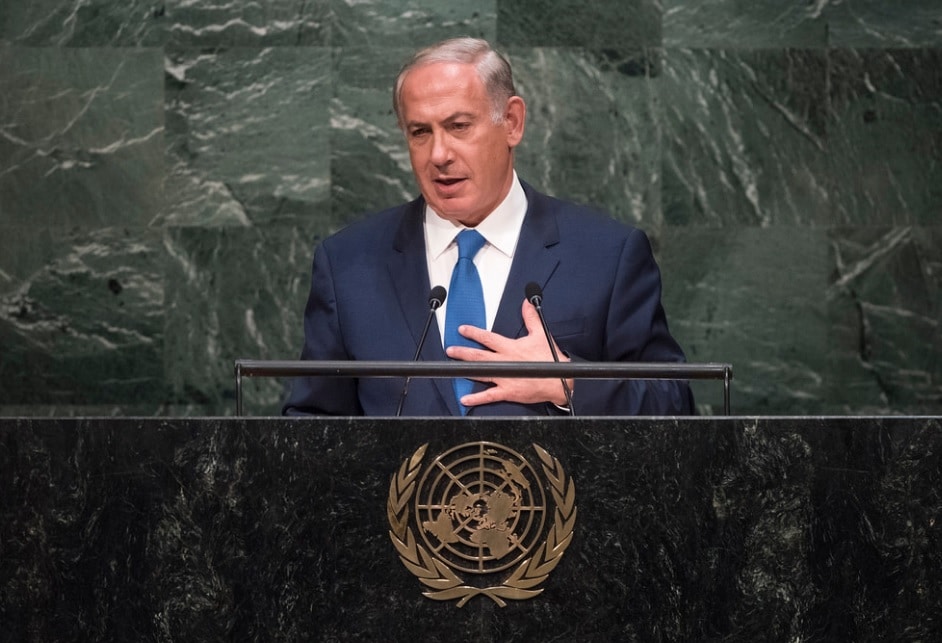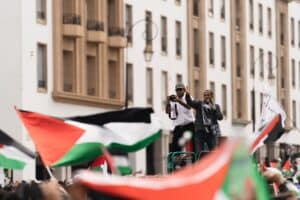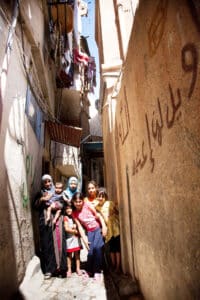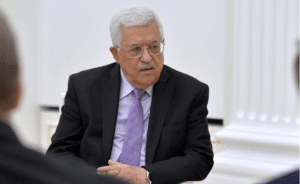On 1 October Palestinians showed their solidarity for the Arab Israeli minority, who feels discriminated by the “Jewish nation-state” law, by accompany them in a general strike. Shops, schools, universities and government offices in the West Bank, Gaze and East-Jerusalem were closed. Prime Minister Netanyahu dismissed criticism on the nation-state law in his address to the UN General Assembly by calling the accusations of apartheid preposterous.
The Law
The Israeli parliament adopted on July 19 the nation-state law with a vote of 62 to 55. The law was already proposed in 2011, but due to years of political debate the law was only put to vote this summer. The nation-state law will be part of the basic laws which makes them part of the constitution, although that can be challenged by the Supreme Court.
The law roughly encompasses three major changes: First, it gives Jews the right of self-determination which means that non-Jews, Arab citizens of Israel, do not share that right. 21% of the Israeli population consist of Arabs, so almost a quarter of the population is being put aside. Secondly, the law makes Hebrew the only official language while for 70 years both Hebrew and Arabic shared this status. Arabs argue that their identity and history is being erased with denouncing the Arabic language. Thirdly, Jewish settlement is being encouraged and labeled as a national value. Netanyahu clarified this point since it was seen as an encouragement of segregation, but according to him they only encourage Jewish settlement in a legitimate way and “implementing the Zionist vision”.
Protest in August
After years of political debate, the law was adapted, and multiple protest broke out, mainly in the beginning of August. On the 5th of August a major protest was held and another big protest followed on the 11th of August, whereby many Israeli Jews joined the protest. Special about the first protest was that it was led by the Druze minority. The Druze are a minority which is an offshoot of the Islam and they make up only two percent (around 120.000) of the population. They are a respected minority and face little discrimination. The biggest communities are located in Lebanon and Syria, but the Druze have a special place in the Israeli society since they take part in military service and are known as loyal supporters of the state. However, the nation-state law makes them feel like second-class citizens. Minority rights are not mentioned in the law and the Arab language has been given a special-status. Unlike the Druze, Arab Israelis do face discrimination, even though they have Israeli citizenship which should provide them with equal rights. In practice they deal with inferior service, bad education, health and house services, therefore, most Arab Israelis identify themselves as Palestinians.
After these initial demonstrations a general strike now followed. Palestinians joined the strike out of solidarity. “It is the minimum we can do for our people against the racist nation-state law,” said Abu Jabir al-Iraqi, a resident of the Israeli Arab town Taybeh. The effectiveness of the strike is being questioned by Palestinians and Netanyahu keeps continuing to defend the law. However, the on-going protest, and especially those of the Druze seemed to have some effect, an adjustment has not been made yet, but some efforts have been taking place. Netanyahu tried to reach a compromise by proposing investment in towns and villages and recognition for Druze service in security forces, but this proposal failed due to fierce accusations by the Druze towards Netanyahu of making Israel an apartheid state which led to withdrawal of the of the compromise.
Criticism
The nation-law is being criticized by the international community. High Representative for Foreign Affairs and Security Policy, Federica Mogherini, expressed her concerns and believes the law complicates a two-state solution. The EU considers the two-state solution as the only way forward, which is now being jeopardized. Turkey also expressed its critique, by calling the Jewish right of self-determination outdated and encouraged the international community to respond on this matter.
Criticism is also being expressed by the President of Israel Reuven Rivlin, which is unusual since the Presidential function is ceremonial and open public criticism is rare. Rivlin acknowledged the fact of discrimination and is wondering if they can do everything in the name of Zionism. Moreover, he thinks that the law will harm the Jews. “I am concerned that the broad manner in which this article was formulated, without balances, is liable to harm the Jewish people, Jews throughout the world and the State of Israel, and can even be used as a weapon by our enemies.” Beside the President, the head of the Israel Democracy Institute, Yohanan Plesne, also expressed his concerns. Plesner and the President of the Union for Reform Judaism, Richard Jacobs, both condemn the fact that the nation-law will become part of the basic laws, therefore, part of the constitution which hurts the state as a democratic nation.
Internal protests and international critique did not cause a withdrawal of the law and what became clear in the address of Netanyahu in the UN General Assembly it’s not going to happen. In his speech he said that people are free to protest against the law, since Israel is a free country, but one cannot call Israel racist.
Sources: CNN, Independent, Jpost, Reuters, Reuters, the Guardian , Times of Israel, VOX
Photo: Flickr



